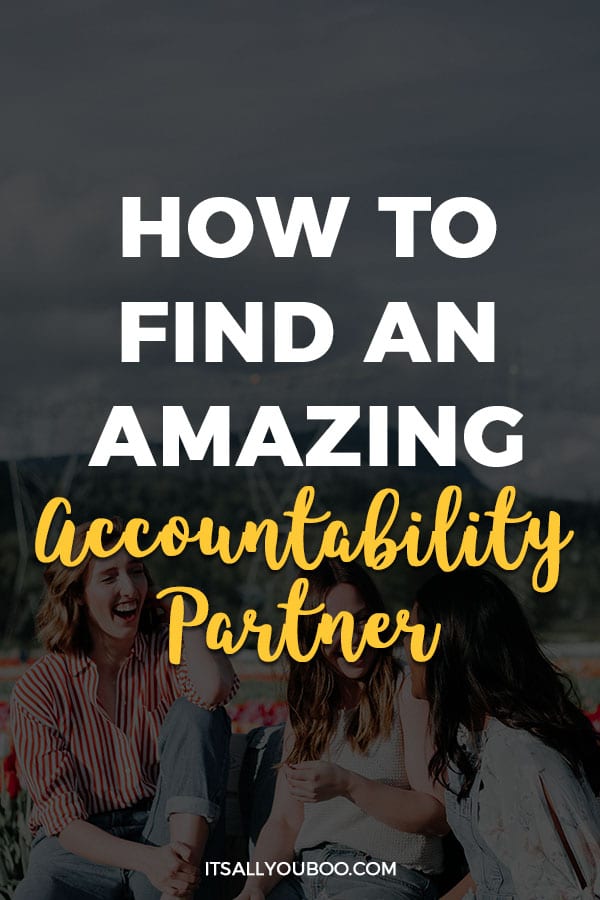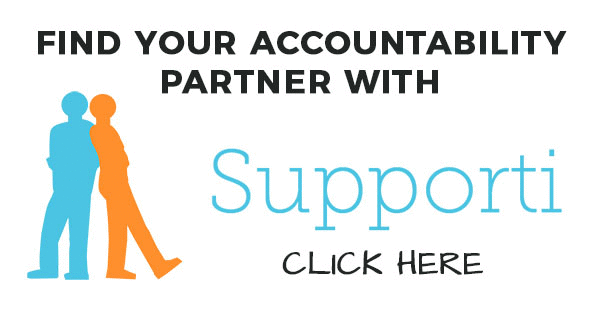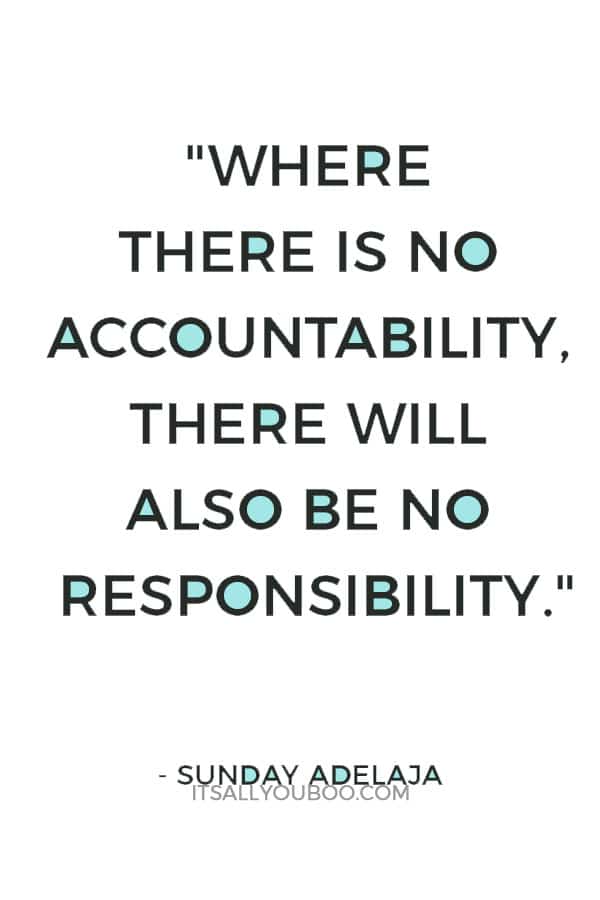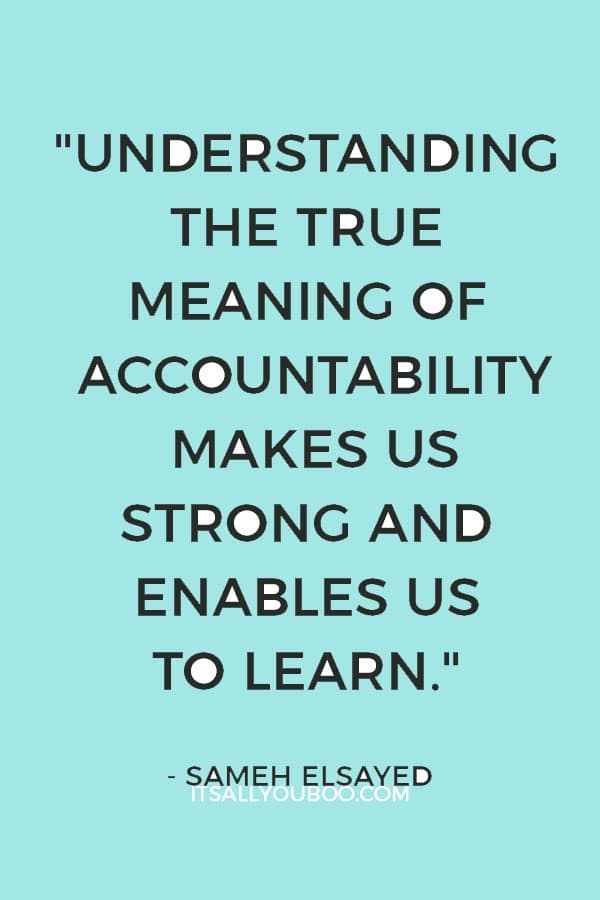What makes a good accountability buddy?
You’ve set a goal and have a plan of attack. Now comes the toughest part: how do you hold yourself accountable to make sure you actually do what you need to?
One of the best ways to stay on track toward your goal? Get an accountability partner.
Table of Contents:
That’s right. Committing your actions to someone and having an appointment to check in with them can increase your chances of success up to 95%.
Here’s how an accountability partner is so effective: When you know that someone is counting on you, you’re motivated to not let them down.
Wondering how to find an accountability partner?
Based on my experience pairing people together as “accountabilibuddies”, I’ve identified some best practices for being an accountability buddy and for finding an accountability partner. In this article, I’ll share suggestions for the most important partner qualities, ideas for where to look for your buddy, and tips on how to set your partnership up for success. Let’s dive in.
THIS POST MAY CONTAIN AFFILIATE LINKS.
IF YOU MAKE A PURCHASE FROM THESE LINKS, I MAY EARN A SMALL COMMISSION.
CLICK HERE FOR MY FULL DISCLAIMER STATEMENT.
What’s an Accountability Partner?
An accountability partner is someone who keeps you honest so you don’t slack off on your goals. They hold you accountable to report back on whether you did what you said you’d do.
A true partnership is reciprocal; in exchange for your buddy’s accountability, you hold your buddy accountable to their goals too. When you both have goals and accountability, it fosters camaraderie. Together, you create a sort of pact to perform given actions.
If you aren’t interested in holding someone accountable in return, then a coach or mentor might be a better fit for you than an accountability partner.
What does it mean to be held accountable?
Being accountable means you commit to an action and then you fulfill that commitment.
Accountability is similar to responsibility. However, a key difference that distinguishes the two is that you’re expected to answer for something when you’re accountable. That’s not always the case for responsibility.
When you set a personal goal, who are you answering to?
Your accountability partner is that person. They’re there to ask you the tough questions, give you feedback, and make sure you level up your life.
In the absence of an accountability partner, you only answer to yourself.
The problem with being accountable only to yourself? For many of us, we go easy on ourselves. We’re more concerned about letting other people down than we are about letting ourselves down. We let excuses get in the way of our own success.
Sound familiar? Then an accountability partner can be a tremendous help to you.
How does accountability partnership work?
To get the most out of an accountability partnership, you’ll need to plan. Here are the steps for success:
- Establish your needs and goals
- Think through the logistics
- Find an accountability partner
The more upfront work you do to think through how an accountability buddy can best support your ambitions, the larger the payoff.
How to Find an Accountability Partner
Before we discuss the places and tools for how to find an accountability partner, we first need to think about what qualities this person should have.
Important accountability buddy qualities
Finding the right person to be your accountability partner is essential. You’re going to need to be open and vulnerable with each other. You’ll probably experience failure (and that’s okay).
The right person can push you past your boundaries. The wrong person can hold you back.
Don’t text your BFF asking them to be your “accountabilibuddy” just yet. First, take a moment to consider what qualities your partner needs to have. Reflect on why you’ve struggled to stay on track in the past. Think about what you really need in order to challenge yourself.
Quotes to Ask When Considering an Accountability Buddy
This will help you define the characteristics you need in your accountability partner. For example:
- Do you tend to make excuses and go easy on yourself? You need someone who’s going to be brutally honest with you.
- Do you need advice? Partner with someone who’s been in a similar situation and has already achieved your goal.
- Does friendly competition motivate you? Get someone with the same goal at a similar or more advanced level than you.
- Do you hate competition? Get someone with a complementary goal in a different domain.
- Does positivity inspire you? Find an accountability partner who’s a natural cheerleader to celebrate your wins with you.
Make a list of the criteria your buddy should have and the type of support you need.
In my research on what qualities make for the best accountability partners, I was surprised to learn that it’s more important for your accountability partner to care about your progress than it is for partners to have a shared goal.
People also said it was important for their buddy to be trustworthy, nonjudgmental, dependable and for them to give positive reinforcement and good advice. Being similar in age, gender, or personality were not considered to be very important accountability buddy traits.
Consider this when creating your accountability partner criteria.
Process for finding an accountability partner
Once you know what you’re looking for, how do you find an accountability partner?
First, evaluate your friends, acquaintances, neighbors, coworkers, and relatives against the criteria you’ve set. I challenge you to consider people you wouldn’t immediately think of.
Be wary of asking someone very close to you to be your accountability partner. Significant others can be hit or miss, depending on your relationship. There’s a risk that well-intended feedback can be taken personally when you’re close to someone. If that’s the case, consider being supportive cheerleaders with that person instead of accountability partners.
Pro-tip: Know someone who’s dependable but who already has an accountability partner? Ask them anyway! Goal-getters tend to have many concurrent goals. You never know if someone may be looking for an “accountabilibuddy” to help them with their next goal!
👉🏽 RELATED POST: Ways to Make New Friends
How to Find Your Accountability Buddy
Keep an open mind. If you’re willing to find someone you don’t already know, here’s how to find an accountability partner from scratch:
- Ask for an introduction! Maybe a friend of a friend is looking for accountability. Let your network know that you’re looking for someone with the qualities you defined above, and that you’re willing to offer accountability in return.
- Attend in-person events in your area where you can meet people with similar goals. For example, a small business owners group would attract other new business owners looking to grow their networks. Search Facebook, Meetups.com, Eventbrite.com, or Google for events in your area.
- Explore virtual communities. Check out apps and websites that pair people up. For example, Reddit has a GetMotivatedBuddies forum for people looking for accountability for all types of topics. Many in-person groups also have virtual communities through Slack channels, Facebook Groups, or other forums. By engaging with these online communities, you can find potential partners.
When you have a strong candidate in mind, the next step is to plan for the partnership.
How to be an Accountability Partner
When considering how to find an accountability partner, you should also be thinking about how to be a good buddy in return.
Make sure you’ve thought about some options for how to arrange your relationship before asking someone to be your accountability buddy. That way, they’ll know what’s involved before accepting or declining.
The best way to convey that you’ll be a fantastic accountability partner? Showing your commitment by planning ahead of time.
Whatever you do, please do not ask someone to be your accountability partner and then expect them to know how to hold you accountable! That’s the equivalent to asking someone out for coffee and expecting them to treat. All the time, people ask for accountability with no plans for how to do it.
If you, in fact, need someone to set all the rules and mechanisms for holding you accountable, then what you need is a coach! There’s nothing wrong with that, but it’s not an accountability partnership.
Remember, dependability is one of the most important qualities of an accountability partner. Show that you’ve given this accountability buddy thing some thought by showing up prepared with suggestions for how and when to check-in together and track your progress.
Need ideas on how to do so? Keep reading.
Plan when and how to have accountability check-ins
Help your buddy help you! Set expectations by having a plan for how this will work.
First, have a plan for logistics. As Benjamin Franklin said, “If you fail to plan, you plan to fail.” With your buddy, you’ll need to decide exactly WHEN and HOW you’ll check in. It should be on a recurring basis (I recommend at least weekly) and should be treated like an appointment. Otherwise, “sometime next week” turns into “next month” which eventually fizzles out.
Some of my favorite tools for staying in touch are:
- Slack (because you can use it to chat AND set reminders)
- Text messaging or any other messaging app, like WhatsApp
- A calendar app for scheduling meetings, such as Google Calendar
- Phone calls or video chat apps like FaceTime or Google Hangouts for meetings
- In-person meetings! At coffee shops, bars, parks—it’s up to you!
You’ll also probably need some way to track your progress with tools like:
- It’s All You Boo’s FREE Habit Tracker Template
- Google sheets
- Project management tools like Asana or Trello
- Goal tracking apps like Google Calendar Goals or Any.do
- Sharing photos as evidence that you did what you said you’d do
- Paper and pen! (Check out bullet journaling)
Decide how you’ll support each other
Besides structure, one of the best things you can provide as an accountability partner is emotional support. You should start thinking about what kinds of support you’d like, and be ready to ask your buddy for their preferences too. Holding someone accountable requires a careful balance between being candid and being compassionate.
Emotional support can include:
- Listening
- Words of encouragement
- Offering advice
- Taking an interest in your buddy’s progress
- Telling you what you need to hear, even if it’s not what you want to hear
- Challenging assumptions gracefully
👉🏽 RELATED POST: How to Improve Emotional Health and Wellness
Words are important! It can’t hurt to establish some ground rules with your accountability partner. If there’s an off-limits topic or question, let them know!
Depending on your relationship, certain phrases can be more empathetic than others.
How to Communicate Effectively
Here are some tips on how to communicate effectively with your buddy:
- Avoid accusation. Instead of “Why didn’t you do it?” ask “How might you do it differently next time?” which shifts the focus from past mistakes to future actions.
- Don’t demand. Instead of “You need to ____”, which can come off as condescending, try, “Have you thought about…?”, which is more collaborative and unassuming.
- Ask if advice is welcomed. Say, “Are you looking for suggestions?” or “Want to hear what I think?” before assuming your buddy wants your opinion.
- Give feedback on behavior, not the person. Instead of making a statement about the person (e.g., “you’re a procrastinator”) make it about the behavior (“you put off the project until the last minute”) which is key for establishing a growth mindset.
- Be clear and concrete. Skip generalizations—it’s more helpful if you’re specific. For example, instead of a generic, “Awesome job!” you could say, “You set aside time to work on this every morning and because of that, you accomplished your goal. Way to go!” This helps your buddy tie certain behaviors back to their success.
👉🏽 RELATED POST: Responding to criticism quotes
Not sure of the best way to communicate with your accountability buddy? Just ask! They may need some time to think about it, or they may need to try it out before they know exactly what words motivate them the most.
Communication is key. As you build your accountability buddy relationship, you’ll learn the best ways to support and motivate for your buddy.
Consider adding consequences
A powerful thing about having an accountability partner? A consequence of failing to meet your commitment is baked in. You’ll either feel proud or disappointed during your accountability partner check-in. Knowing this can motivate you to act.
Want to add incentives and disincentives for additional motivation? Your accountability partner can act as the enforcer.
For example, you could give your buddy $30 at the beginning of the week. Depending on whether you performed a given action, they will either use the money to buy you something nice (e.g., dinner) or keep it. Humans tend to be loss averse, so this can be an effective add-on if you need some additional motivation.
Adding these additional consequences isn’t for everyone, and it’s totally up to you and your buddy if you’d like to try it!
Asking Someone to be your Accountability Partner
Now that you know how to find an accountability partner and you’ve thought through some of the logistics, the next step is asking them.
It doesn’t have to be a grandiose proposal. In fact, I’d suggest the opposite.
Pilot test your accountability partner!
How to ease into an accountability partnership
While you may be tempted to present your spreadsheets, calendar, and tracking apps in a carefully-rehearsed powerpoint presentation, hold off just yet. Jumping right into all the details can overwhelm the person you’re asking to be your accountability buddy.
Instead, invite them to a pilot test, then pitch your well-thought-out plans.
You can say something like, “Hey! I know you’ve been training for a half marathon. I’m also working on cycling longer distances. How about we commit to a goal for the next week and hold each other accountable to it?” Then, decide how much you’ll cycle or run and agree upon when you’ll check back in during the following week.
The measure of success of this test isn’t whether or not you met your goal. It’s whether your buddy is engaged enough to follow up with you during the week and to check-in at your scheduled time.
Recall that the most successful buddies are the ones who care about your progress and are dependable. In other words, they commit and show up.
If you buddy flakes out on your check-in or doesn’t seem into the whole thing, move on. If they can’t be your buddy for one week, then they certainly can’t do it for the long term. Time to find someone else.
But if the one-week test went well (your buddy motivated you and the interest seems mutual), then go ahead and ask them to your accountability partner! Unleash all those detailed logistical plans you already thought through. Let them know some of the ideas you’ve had about how you could track progress and check in regularly. See what they think, and be open to trying some things out.
When an Accountability Partner isn’t Working
If you ask someone to be your partner and they give a vague, noncommittal, unenthusiastic response, abandon this attempt and move on as quickly as possible!
Otherwise, you’re going to be doing extra work trying to motivate them to be your buddy on top of motivating them to complete their goals. In that case, you’re better off just holding yourself accountable! Remember, an accountability partnership should be mutually beneficial.
Some people simply aren’t motivated by external expectations (check out Gretchen Rubin’s Four Tendencies Quiz for a fantastic breakdown of what motivates people). That’s okay! It’s better to keep looking for the right person than to force a bad fit.
👉🏽 RELATED POST: Motivation Killers You Need to Know About
As the saying goes, “If it’s not a HELL YES, it’s a no.”
If someone needs to be convinced to be your accountability partner, then they’re not going to be a motivating force in your life. Say something like, “I see you’ve got a lot on your plate right now. That’s okay. Thanks anyway!” and move on. It’s not worth your time.
Prolonging the partnership could actually harm your relationship with that person. You won’t get what you need from them, and they think they’re doing you a huge favor.
Similarly, if you had an accountability partner who started strong but is now flaking, it’s okay to end it and find someone new. Politely say it’s not working for you and thank them for their time.
Be patient
The secret for finding an accountability partner is that you should continually be considering new people as potential buddies and revising your criteria as you learn along the way.
How you find someone to be your accountability partner looks different for everyone, and it may take a couple of tries. You may need to adjust your criteria, or just keep asking around.
Ready to find an accountability partner that just right for you? Click here to get a free week of Supporti, the accountability partner app.
Are you struggling to stay focused and achieve your goals? You need an accountability buddy! Click here to find an accountability partner by @getsupporti #AccountabiliBuddy #Motivated #DailyGoals #AchieveYourGoals
How will you find an accountability partner?

More About Guest Contributor
Brigitte Granger is CEO and Founder of Supporti, the accountability partner app. Supporti helps people stay motivated and on track with their self-improvement goals by pairing people together as accountabilibuddies. Her goal is to help people find the social support and accountability they need to achieve more and be their best selves.
Last Updated on May 31, 2025












